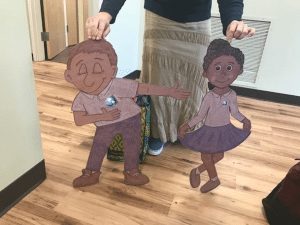Exploring Language in the Classroom: From Babble to Bilingual
From the first coos to the joyful shout of a new word, language development in early childhood is one of the most fascinating and foundational parts of learning. At Montessori Kids Universe, we know that infant language development begins long before a child says their first word. Our Montessori infant classrooms are intentionally designed to support this vital stage through purposeful interaction, rich environments, and multilingual exposure.
Language Starts Before Words
Babies are born ready to learn language. From day one, they’re listening. Even before they can speak, they’re tuning into the tone, rhythm, and emotional cues of voices around them. That’s why our teachers at MKU engage with infants through eye contact, gentle speech, and narration of daily routines.
When we talk to infants while changing a diaper or preparing a bottle, we’re doing more than just filling the silence. We’re laying the foundation for vocabulary, comprehension, and social connection. According to the Center on the Developing Child at Harvard, these early interactions form critical neural pathways that support language and cognitive development.
The Classroom Environment Speaks, Too
In a Montessori infant classroom, the environment is as much a teacher as the adult in the room. Our spaces are intentionally calm and beautiful, designed to support focus and comfort. But they’re also rich with language experiences.
We incorporate books with real-life images, soft music with simple lyrics, and materials that invite naming, touching, and describing. As children grow, they’re introduced to language trays, early sound games, and matching cards—all grounded in real-world concepts. Children don’t just memorize words—they understand them in context.
The Montessori Approach to Infant Language Development
Dr. Maria Montessori introduced the concept of the absorbent mind—the idea that young children effortlessly absorb information from their surroundings. Nowhere is this more evident than in infant language development.
In our classrooms, every moment is an opportunity for language. Teachers carefully observe where each child is on their communication journey, whether they’re babbling, signing, or starting to string words together. We don’t correct. We model. We don’t rush. We wait, listen, and respond. Our goal is to help each child feel heard, valued, and confident.
These simple, respectful conversations build trust and help infants understand the rhythm and purpose of communication.
Introducing Foreign Language Early
Language exposure at MKU goes beyond English. Through our foreign language enrichment, infants and toddlers are gently introduced to other languages through music, stories, and daily conversation.
Even if a child isn’t speaking yet, hearing a variety of sounds supports their brain’s ability to process and differentiate language. According to the National Institute for Early Education Research, early multilingual exposure enhances memory, problem-solving, and phonological awareness.
Our teachers bring their own linguistic backgrounds into the classroom, greeting children in different languages, singing cultural songs, and reading diverse books. Whether it’s Spanish, French, Mandarin, or another language, these experiences broaden each child’s world in a natural, joyful way.
Language as a Social Experience
One of the things that makes Montessori unique is the multi-age classroom. Infants hear language not only from their teachers but also from older children. This social learning environment gives younger students the chance to observe and respond to more advanced vocabulary and sentence structure.
Parents are part of this process too. We provide simple strategies to extend early childhood language learning at home—like narrating your day, singing together during a drive, or reading before bedtime. When school and home are in sync, children receive the consistency they need to thrive.
Celebrating Every Step
At MKU, every sound, sign, or sentence is a step worth celebrating. Whether your child is cooing in response to a familiar face or starting to put two words together, it’s a meaningful moment. Our teachers recognize that language isn’t just about speaking—it’s about connection, expression, and understanding the world.
By creating a space where every voice matters, we’re helping children become confident communicators for life.
See Infant Language Development in Action
Our commitment to infant language development is part of a bigger picture: a classroom environment where learning happens through love, structure, and meaningful engagement. This is more than daycare. This is education with purpose.
Ready to experience it firsthand?
Schedule a tour today and see how MKU helps every child find their voice—starting from day one.


